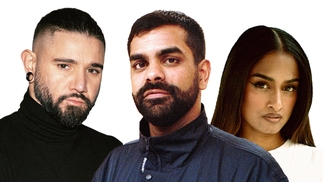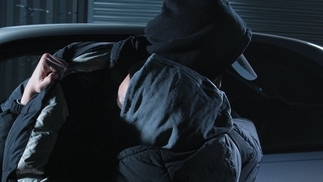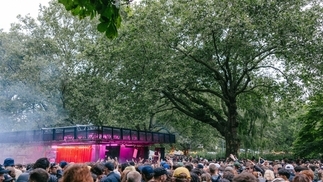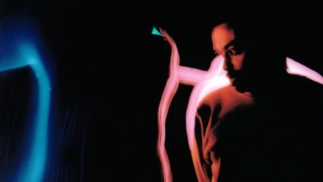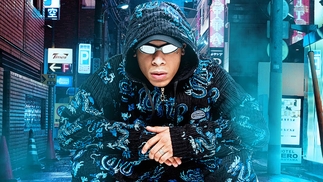Meet The MC: Bala Bala Boyz
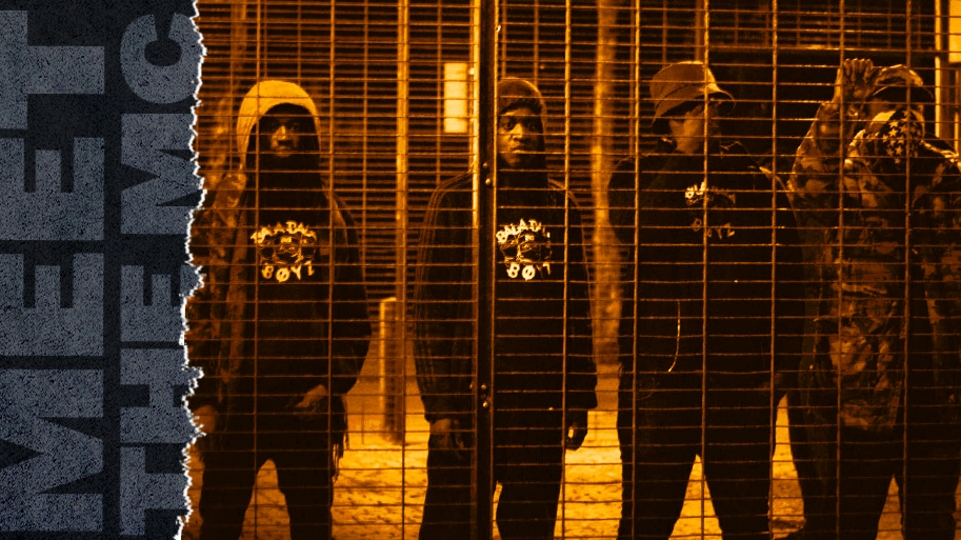
Meet the MC is DJ Mag's new monthly interview series, getting to know emerging MCs on the electronic music scene. This month, DJ Mag’s Amy Fielding catches up with London collective, Bala Bala Boyz, about the influence of Congolese heritage on their sound, high-energy performances, and the importance of retaining authenticity
For fans of: Ecko Bazz, Ahadadream, NKC
Huddled in a circle on the dark, smoke-filled dancefloor at Corsica Studios, the four MCs that make up Bala Bala Boyz spit over syncopated bass-heavy rhythms, passing a single microphone between the collective's members. Captivating crowds with their energy, and an effortless ability to flow as a family unit, it’s on these South London dancefloors — as well as DIY festivals like Kallida and Boiler Room's four-day London takeover last year — that Bala Bala Boyz come alive. Translating what BBB say is a “Bala Bala lifestyle” into productions and performances, the collective are using their ideologies to carve a sound that runs parallel with their roots, but that’s also club ready.
Currently consisting of four members — Moj Zyo 1, King Bala 5, Orz Trinity 7, and Chef Kalinga 9 — the collective are from different corners of the capital, but all share the same Congolese background. They fuse Lingala, a Bantu language used by over 8 million people in the Congo and parts of Angola, with London slang, and sounds of the UK underground. They’re trailblazers for authenticity, melding genuine elements of traditional, Congolese-led flows with the new, and deriving their own dialect in the process: Linglish.
When DJ Mag speaks to the collective, it’s coming to the end of a huge year, which Bala Bala Boyz say has been both “progressive and productive”. They’ve been spitting on the radio, alongside the likes of Hyperdub’s Shannen SP and DJ Martha on NTS, and performing live across the city. 2019 also saw BBB lock in their first Boiler Room performance, as part of their four-day music festival in London. Their unique style of MCing is something that member Chef says started simply as a “bit of fun”.
“The inspiration for BBB came from a bunch of family and friends who shared a passion and decided to make new tunes,” Chef tells DJ Mag. “Nothing serious – just some fun rapping in Linglish, and it created a buzz.” The structure of the actual group goes back to their Congolese roots. Comparing this structure and direction to musicians from the Congo, BBB explain that the majority of musicians develop and refine their skills in big orchestras, before breaking off to go and make their own. “Everyone was making music in some capacity before we formed BBB,” he says. “Each person brings a different element in.”
Although the line-up has seen a reshuffle since forming a few years ago, they decided as a unit to step up and take the collective seriously, and now consider it a “profession”. Although they have dwindled in numbers, they say this has made the sound more refined.
Their first official release, ‘That’s My Baby’, featuring old and past members of the current collective, is worlds away from the sound they now regularly record. Their style of MCing, though, garnered the attention of DJs and producers such as London’s Tash LC, back in 2017. Appearing frequently on Radar Radio alongside Tash, BBB were ultimately introduced to DJ, producer and More Time Records boss, Ahadadream. “Our Congolese flows on international beats sonically fit in with the unique More Time sound,” Chef says. “We linked up, and the vibe was right from the take off. From there, it grew organically. When it came to music for the label, it wasn’t hard to translate the fun vibes.
“The introduction to More Time has helped us broaden our horizons, rather than develop. Bala Bala Boyz aren’t just MCs – we’ve been making music from other genres from our inception – but More Time is such a hub of different styles and flavours from all over the world. We’ve been able to incorporate that into our world, and give it a Bala Bala twist.”
Rumba is the national style of music from the Congo, and it’s been at the forefront in the country since the 1950s, transcending and evolving over generations. It’s here that BBB finds their authenticity. Their knowledge and understanding of the sound is deep-rooted in everything they do, from their production to their language. “Rumba is essentially Congolese folk music,” Chef explains. “It’s mainly homemade percussion instruments, married with chants and harmonised melodies. OK Jazz was an Orchestra led by a legendary guitarist called Franco Luambo, who is undoubtedly one of Africa’s best, if not the best, guitarist.” OK Jazz were the biggest exporters of Congolese music across the world, playing in all continents, and the orchestra’s style of Rumba Odemba is BBB’s main inspiration.
Their debut album, ‘Linglish Storm’, which was released in 2017, again features new and old members alike, and was the first LP that introduced listeners to the fast-paced, menacing style of flow that is now synonymous with BBB. They’ve since released an EP and a single on the aforementioned More Time Records – the EP ‘Bana Zamba’ features the track that propelled the collective’s rise, ‘Baza Ba Skivere’. Newer single ‘Mafuta’, released at the back end of 2019, is a vibrant, dancefloor-orientated record, produced by Reuben G.
Retaining authenticity is key for BBB. “We live what we speak about, the life of a Bala Bala Boy is what we simply describe as ‘pents’,” Chef says. “It’s like we live in the same world, but we’re in a completely different world at the same time. The way we speak, the way we act when performing live. It’s all in a different time and pattern.”
When it comes to the ideologies and the lifestyle that the artists speak of, as opposed to their sound, their inspiration is different, and they cite a Congolese group known as Wenge Musica 4x4. “This group were the first collective of young men under 30 to be successful, and take their music out of the ghetto and into the mainstream, in an industry led by older men and structures” Chef says. “Everything about them was different: their style, their sound, their way of life. The group broke off in the late ‘90s, but each member created their own group. Most of the current artists in the Congo are direct descendents of Wenge.”
Another part of what makes Bala Bala Boyz so unique is their presence and energy. From the Ø parties at London’s Corsica to Boiler Room, the collective brings a fire from within, and it’s a key part of what they call the “Bala Bala experience”. “With any sports team, the way they improve and strengthen chemistry is by training and playing matches often,” Chef says. “We link up weekly, in all-night studio sessions so everything is fresh in our heads. Being fans of each other individually makes us genuinely interested in what each member will bring to tracks we make.”
In 2019, BBB spent most of the year working on two projects simultaneously, “both completely different, but both very authentic Bala Bala Material,” Chef shares. “Moving into 2020, you’ll be able to catch us monthly on Rinse FM, where there will always be fresh Bala Bala sounds.We’re going to release the projects, some more singles, and visuals. We’re spreading the sound, and growing the movement.”
